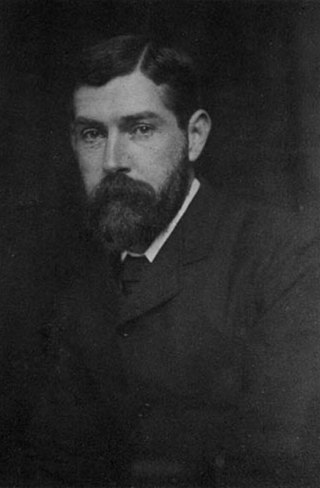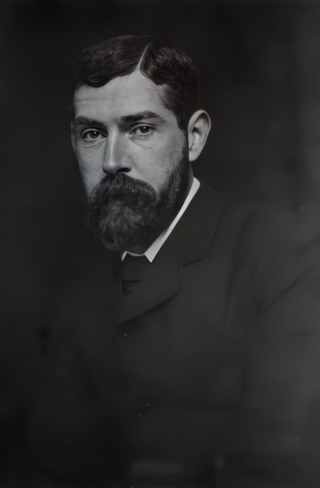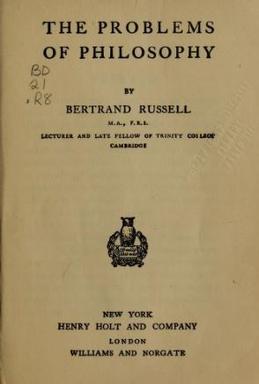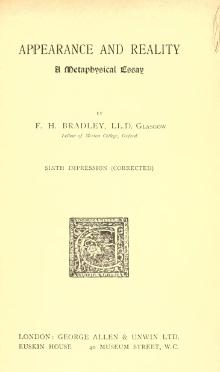
Idealism in philosophy, also known as philosophical idealism or metaphysical idealism, is the set of metaphysical perspectives asserting that, most fundamentally, reality is equivalent to mind, spirit, or consciousness; that reality is entirely a mental construct; or that ideas are the highest form of reality or have the greatest claim to being considered "real". The radical latter view is often first credited to the Ancient Greek philosopher Plato as part of a theory now known as Platonic idealism. Besides in Western philosophy, idealism also appears in some Indian philosophy, namely in Vedanta, one of the orthodox schools of Hindu philosophy, and in some streams of Buddhism.
In metaphysics, identity is the relation each thing bears only to itself. The notion of identity gives rise to many philosophical problems, including the identity of indiscernibles, and questions about change and personal identity over time. It is important to distinguish between qualitative identity and numerical identity. For example, consider two children with identical bicycles engaged in a race while their mother is watching. The two children have the same bicycle in one sense and the same mother in another sense. This article is mainly concerned with numerical identity, which is the stricter notion.
Analytic philosophy is a branch of philosophy using analysis, popular in the Western world and particularly the Anglosphere, which began around the turn of the 20th century in the contemporary era in the United Kingdom, United States, Canada, Australia, New Zealand, and Scandinavia, and continues today. Analytic philosophy is often contrasted with continental philosophy, coined as a catch-all term for other methods, prominent in Europe.

A subset of absolute idealism, British idealism was a philosophical movement that was influential in Britain from the mid-nineteenth century to the early twentieth century. The leading figures in the movement were T. H. Green (1836–1882), F. H. Bradley (1846–1924), and Bernard Bosanquet (1848–1923). They were succeeded by the second generation of J. H. Muirhead (1855–1940), J. M. E. McTaggart (1866–1925), H. H. Joachim (1868–1938), A. E. Taylor (1869–1945), and R. G. Collingwood (1889–1943). The last major figure in the tradition was G. R. G. Mure (1893–1979). Doctrines of early British idealism so provoked the young Cambridge philosophers G. E. Moore and Bertrand Russell that they began a new philosophical tradition, analytic philosophy.

Bernard Bosanquet was an English philosopher and political theorist, and an influential figure on matters of political and social policy in the late 19th and early 20th centuries. His work influenced but was later subject to criticism by many thinkers, notably Bertrand Russell, John Dewey, William James and Ludwig Wittgenstein. Bernard was the husband of Helen Bosanquet, the leader of the Charity Organisation Society.

Francis Herbert Bradley was a British idealist philosopher. His most important work was Appearance and Reality (1893).
Timothy Lauro Squire Sprigge, usually cited as T. L. S. Sprigge, was a British idealist philosopher who spent the latter portion of his career at the University of Edinburgh, where he was Professor of Logic and Metaphysics, and latterly an Emeritus Fellow.

Logical atomism is a philosophical view that originated in the early 20th century with the development of analytic philosophy. It holds that the world consists of ultimate logical "facts" that cannot be broken down any further, each of which can be understood independently of other facts.

In the fields of philosophy, the terms obscurantism and obscurationism identify and describe the anti-intellectual practices of deliberately presenting information in an abstruse and imprecise manner that limits further inquiry and understanding of a subject. The two historical and intellectual denotations of obscurantism are: (1) the deliberate restriction of knowledge — opposition to the dissemination of knowledge; and (2) deliberate obscurity — a recondite style of writing characterized by deliberate vagueness.

The Problems of Philosophy is a 1912 book by the philosopher Bertrand Russell, in which the author attempts to create a brief and accessible guide to the problems of philosophy. He introduces philosophy as a repeating series of (failed) attempts to answer the same questions: Can we prove that there is an external world? Can we prove cause and effect? Can we validate any of our generalizations? Can we objectively justify morality? He asserts that philosophy cannot answer any of these questions and that any value of philosophy must lie elsewhere than in offering proofs to these questions.

A History of Western Philosophy is a 1946 book by British philosopher Bertrand Russell (1872–1970). A survey of Western philosophy from the pre-Socratic philosophers to the early 20th century, each major division of the book is prefaced by an account of the historical background necessary to understand the currents of thought it describes. When Russell was awarded the Nobel Prize for Literature in 1950, A History of Western Philosophy was cited as one of the books that won him the award. Its success provided Russell with financial security for the last part of his life. The book was criticised, however, for over-generalizations and omissions, particularly from the post-Cartesian period, but nevertheless became a popular and commercial success, and has remained in print from its first publication.
The Muirhead Library of Philosophy was an influential series which published some of the best writings of twentieth century philosophy. The original programme was drawn up by John Muirhead and published in Erdmann's History of Philosophy in 1890. This statement was published in slightly altered form in subsequent volumes:
Philosophy is the study of general and fundamental problems concerning matters such as existence, knowledge, values, reason, mind, and language. It is distinguished from other ways of addressing fundamental questions by being critical and generally systematic and by its reliance on rational argument. It involves logical analysis of language and clarification of the meaning of words and concepts.
Leemon McHenry is a bioethicist and Emeritus Professor of Philosophy at California State University, Northridge, in the United States. He has taught philosophy at the University of Edinburgh, Old Dominion University, Davidson College, Central Michigan University, Wittenberg University and Loyola Marymount University, and has held visiting research positions at Johns Hopkins University, UCLA and at the Institute for Advanced Studies in the Humanities in the University of Edinburgh. His research interests center on medical ethics, metaphysics, and philosophy of science.

Alfred Edward Taylor, usually cited as A. E. Taylor, was a British idealist philosopher most famous for his contributions to the philosophy of idealism in his writings on metaphysics, the philosophy of religion, moral philosophy, and the scholarship of Plato. He was a fellow of the British Academy (1911) and president of the Aristotelian Society from 1928 to 1929. At Oxford he was made an honorary fellow of New College in 1931. In an age of universal upheaval and strife, he was a notable defender of Idealism in the Anglophone world.
The following outline is provided as an overview of and topical guide to metaphysics:

The aspects of Bertrand Russell's views on philosophy cover the changing viewpoints of philosopher and mathematician Bertrand Russell (1872–1970), from his early writings in 1896 until his death in February 1970.

John McTaggart Ellis McTaggart was an English idealist metaphysician. For most of his life McTaggart was a fellow and lecturer in philosophy at Trinity College, Cambridge. He was an exponent of the philosophy of Georg Wilhelm Friedrich Hegel and among the most notable of the British idealists. McTaggart is known for "The Unreality of Time" (1908), in which he argues that time is unreal. The work has been widely discussed through the 20th century and into the 21st.

Essays on Truth and Reality is a 1914 book by the English philosopher Francis Herbert Bradley, in which the author expounds his philosophy of absolute idealism and gives the classic statement of a coherence theory of truth and knowledge.

History and Class Consciousness: Studies in Marxist Dialectics is a 1923 book by the Hungarian philosopher György Lukács, in which the author re-emphasizes the philosopher Georg Wilhelm Friedrich Hegel's influence on the philosopher Karl Marx, analyzes the concept of "class consciousness," and attempts a philosophical justification of Bolshevism.











